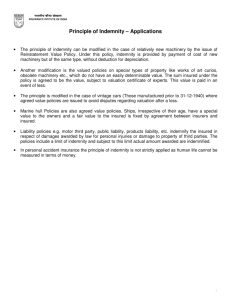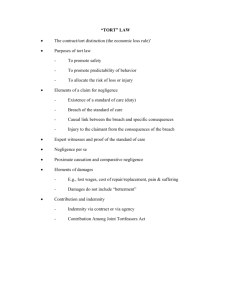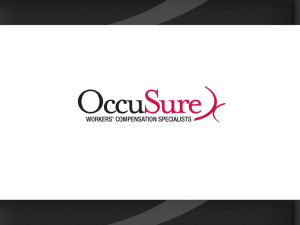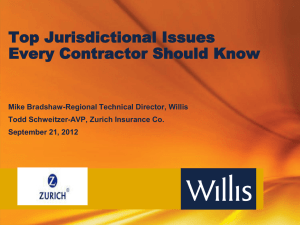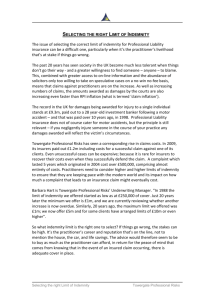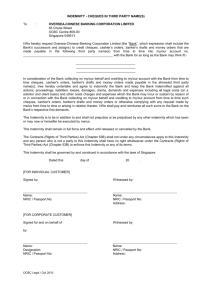Indemnity 101 CLE 9-30-14 - Mozley, Finlayson & Loggins LLP
advertisement
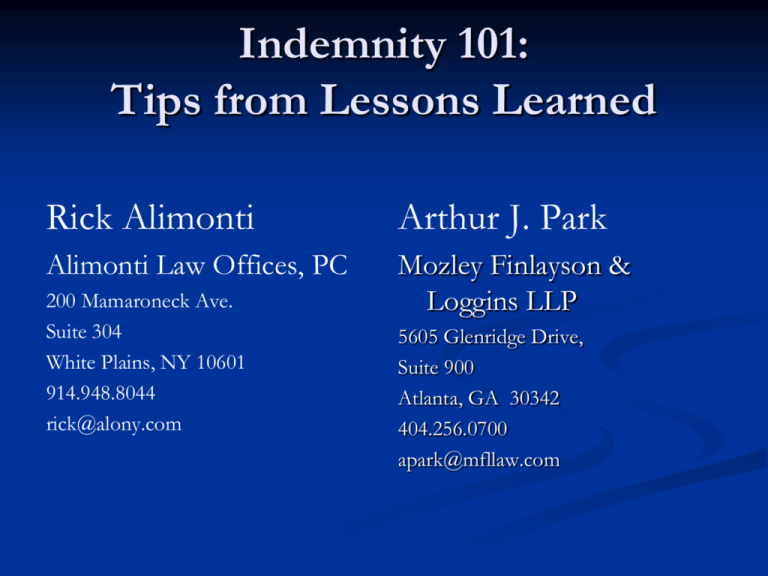
Indemnity 101: Tips from Lessons Learned Rick Alimonti Arthur J. Park Alimonti Law Offices, PC Mozley Finlayson & Loggins LLP 200 Mamaroneck Ave. Suite 304 White Plains, NY 10601 914.948.8044 rick@alony.com 5605 Glenridge Drive, Suite 900 Atlanta, GA 30342 404.256.0700 apark@mfllaw.com So What is Indemnity? What isn’t it? It is not a liability-shifting mechanism. It cannot bind a non party to whom you are liable Vis-à-vis such a non party, you remain liable, and from their perspective, the indemnity may well be invisible. It is not insurance and, in fact, law is underdeveloped What is it? A risk management tool whereby one party (indemnitor) is answerable for the damage (and perhaps defense) of another (indemnitee). When Will Indemnity Arise? When a claim arises under circumstances in which another party is primarily responsible and/or contractually responsible to indemnify you. Contractual Indemnity Contract risk-management provision Often “imposed” by party with greater bargaining power over more dependant party. Example: Imposed by Port Authority on airlines and contractors Imposed by airlines on service providers Goal: insulate one party for damages and defense costs “arising from” contractual relationship with another. Contractual Indemnity Is there an agreement? Signed In Effect – not expired Between correct parties Superseded by another agreement Notice provision Voided: release, bankruptcy, etc. Types of Indemnity Agreements Narrow form: only covers the indemnitor’s negligence Intermediate form: covers indemnitee’s passive negligence and indemnitor’s negligence Broad form: covers indemnitor’s negligence and even the indemnitee’s own negligence Majority view: cannot cover gross negligence or intentional misconduct And Common Exceptions The foregoing indemnity shall not apply in the event of injuries or damage to property caused by the reckless or wilful misconduct of the Airline or its agents and employees AND/OR The foregoing indemnity shall not apply in the event of injuries or damage to property caused by the sole negligence of the Airline or its agents and employees Example 1 - FBO “FBO shall indemnify, defend, and save harmless owner, and owner’s officers, agents, employees, directors, successors and assigns, from and against any and all loss, claims, demands, costs, expenses of every nature, including reasonable attorney’s fees (including fees to enforce this clause) arising directly or indirectly from or in connection with the use and operation of the aircraft by FBO, except when any such claims arise from the sole negligence of owner.” Example 2 - what not to do “BOB hereby agrees to indemnify, defend and hold harmless ADAM from and against (i) all claims, costs, expenses or damages of any nature whatsoever (including reasonable attorney fees and court costs) asserted against or incurred by ADAM resulting from the use of or in any way related to any work done under authority of the STC by any entity other than ADAM (or any other party licensed or authorized by it) after the completion of the transfer of the STC to BOB pursuant to these terms; and (ii) any claims, costs, expenses or damages asserted by any person or agent, or employee of BOB in performance of this Agreement, but excluding…any claims, costs, expenses or damages which are caused by or result from the negligence or the fraudulent or willful misconduct of ADAM.” Obstacles to Indemnity Questions of Fact? Issue of party’s sole negligence or reckless/wilful misconduct may form basis for argument that tender is “premature”. This will be particularly so if language is not clear on duty to defend and what triggers this duty. Legal Principles Governing Indemnity Agreements Choice of law: lex loci contractus, most significant relationship, or choice of law clause in the contract Contracts of indemnification are to be strictly construed against the indemnitee Duty to indemnify is a question of law Example 3 Contractor shall indemnify, defend, and hold harmless Airline for any and all claims, losses, and damages (including attorneys’ fees and court costs) arising out of or related to Contractor’s performance of the Contract, including claims brought by Contractor’s agents and employees. Example 4 – service k with airline Contractor shall release, indemnify, defend and hold harmless Delta…from and against any and all claims…which in any way arise out of or result from any act(s) or omission(s) by Contractor (or anyone directly or indirectly employed by Contractor or anyone for whose acts Contractor may be liable) in the performance or nonperformance of Services or other obligation under this Agreement…This Section shall apply regardless of whether or not the damage, loss or injury complained of arises out of or relates to the negligence (whether active, passive or otherwise) of, or was caused in part by [Delta]. However, nothing contained in this Section, shall be construed as a release or indemnity by Contractor of [Delta] from or against any loss, liability or claim arising from the sole negligence or willful misconduct of [Delta]. When does duty to indemnify attach? Contractual Indemnity distinguished from Insurance Policy For Indemnity [unlike insurance], duty to defend MAY NOT BE BROADER than duty to indemnify Need broad indemnity language or you may be footing defense bill until duty to indemnify is established. Incident Occurs-Investigation What are circumstances? Who are involved parties? Who has involvement in underlying incident or area in which it occurred? What does the applicable document say as to 1. Indemnity? 2. Insurance? Do you have documents to support additional insured status? Triggering Indemnity: What do you do, and how do you know? Notice of Claim – formal or informal The sooner you advise the party from whom you seek the indemnity of the underlying occurrence, the better Put it in writing Insurer will likely assist or handle but stay involved At the end of the day it is you, not the insurer, that is entitled to be indemnified What can undermine indemnity? Adhesion contract – contra preferentem Public Policy – against “free ride” Ambiguity Failure to include specific claims, e.g., including claims by indemnitor’s employees – very important Punitive damages not subject to indemnity – wrong party would be “punished” The test for broad form indemnity Majority view: not against public policy But, indemnity agreement will not be construed to cover the indemnitee’s own negligence unless contract is clear and unequivocal Initial presumption against broad form indemnity Language must show a “clear intent” to indemnify the other party’s own negligence, but there are no “magic words” Example 5 – broad form? “The Contractor [C.R.A.] agrees to indemnify, defend and hold harmless Eastern [Air Lines],…directors, officers, employees, agents and representatives from and against all claims, liability, loss or expense, including legal fees and court costs, arising out of or in connection with this agreement including, but not limited to claims of employees of Contractor, claims of employees of Eastern and/or City, claims arising out of injury, death or property damage, direct or consequential, to any person or entity…The foregoing indemnification does not apply to any claims arising out of the gross negligence or willful misconduct of Eastern.” Fact Pattern – Additional Insurance and Multiple Indemnities Sally Slip, age 45, is employed by On-The-Spot Cleaners, Inc., a contractor that cleans aircraft interiors. On January 4, 2014, she had just completed cleaning an aircraft when she fell at the foot of the air stairs on a patch of black ice. She suffered a broken arm (humerus) and a concussion. She claims soft tissue damage, herniated disc and inability to ever return to work, i.e., permanent disability. Fact Pattern (cont’d) The aircraft she had just serviced was owned and operated by Excelsior Airlines. The accident took place on the Excelsior ramp at Sunshine Municipal Airport in Sunshine, New York. The town of Sunshine is the owner of the airport and Excelsior’s landlord. Excelsior is a small regional airline that contracts with Shovel & Salt for snow removal on the Excelsior ramp. Some Critical Contract Language Shovel & Salt Contract: Shovel & Salt is to perform no snow or ice removal within 50’ of an aircraft unless specifically requested by airline. If airline requests such services within 50’, Airline must indemnify Shovel & Salt against any damages to property related to the provision of this service. Contract Language Salt and Shovel contract requires snow removal on ramp upon 2” accumulation. According to contract, salt and sand are only applied “on demand” from Excelsior There is no patrol obligation in contract, but Shovel & Salt nonetheless patrols for snow and ice and applies melting agents and salt as it deems appropriate. Contract Language Excelsior Airline Indemnity to Sunshine Township: Excelsior Airline agrees to indemnify and defend township for all injury and property damage arising out of Airline’s use of the leasehold unless caused by the sole negligence of Sunshine or Sunshine’s agents or employees. Contract Language On-the-Spot Contract with Airline On-the-Spot is required to indemnify and defend Airline for all claims for damages and personal injury arising out of On-the-Spot’s provision of services to Airline. However, the indemnity provision in the contract does not specifically extend to claims brought by On-theSpot’s own employees. The contract is silent on this issue. Contract Language Shovel & Salt License with Sunshine Township: In order to provide services to airport tenants, Shovel & Salt has also entered into a license with Sunshine Township requiring Shovel & Salt to indemnify and defend Sunshine for all claims for damages and personal injury arising out of Shovel & Salt’s provision of services on any airport premises. On-the-Spot License with Township NONE ON FILE! Hurray! You’re Indemnified! Now What? You are still being sued You are still in the caption And you may be giving away the control of your defense Do you care? Yes! Why? Company Reputation; Adverse Press; Res Judicata; Jurisdictional Implications; Sanctions; Bad Handling After the Indemnity is Accepted: Maintain active role You remain a client You may not want law firm to be doubling on defendants (waiver of privilege?) You will want role in defense and settlement You may want counsel of your choosing, not indemnifying party’s What About a Reservation of Rights Party from whom you seek indemnity reserves rights to withdraw defense and/or decline indemnity In vast majority of cases reservation is not effectuated and defense is not withdrawn Nonetheless, you are on notice! Counsel cannot defend you while looking to escape indemnity – grounds for conflict Should you demand independent counsel? MGLA 186 § 15. Non-liability of landlord; provisions in lease or rental agreement Any provision of a lease [in which] by the use of any words whatsoever, the effect of which is to indemnify the lessor or landlord or hold the lessor or landlord harmless . . . from any or all liability to the lessee or tenant, or to any other person, for any injury, loss, damage or liability arising from any omission, fault, negligence or other misconduct of the lessor or landlord . . . shall be deemed to be against public policy and void. Compare: N.Y. Gen. Oblig. L § 5-322.1, which is more limited in scope and applies to construction, renovation, maintenance, demolition etc. of property Limit in the construction context “A covenant…in connection with…a contract or agreement relative to the construction, alteration, repair, or maintenance of a building…purporting to require that one party to such contract or agreement shall indemnify…the other party to the contract…against liability…caused by or resulting from the sole negligence of the indemnitee…is against public policy and void and unenforceable.” O.C.G.A. § 13-8-2(b) Indemnity’s Cousin: Additional Insured Status Separate and distinct from indemnity provision Should Implement Indemnity Should be policed at renewal Endorsements Insurance Certificates Make clear that insured status is bargained-for provision and part of consideration Additional Insured cont. Also known as the duty to procure insurance Does the insurance meet the contractual obligations? Limits; Policy Period: Are there exclusions that essentially eviscerate the coverage required under the contract? Exemplar Additional Insured Term: In furtherance of the preceding indemnity obligation, contractor shall procure a comprehensive general liability policy having limits in the amount of $10X and $5X per occurrence with no deductible or self-insured retention. Said insurance shall be primary and shall displace any other insurance held by the Airline except to the extent the above limits are insufficient, in which case the Airline’s coverage shall be deemed excess. Why the concern about deductible? Actual Case Personal injury action – passenger injured when aircraft door shut on foot by Caterer Caterer had [we believe] US$1 Million SIR. Caterer accepted tender and then later rejected it as when value revealed. Why? It was their own money! Large SIR made insurance requirement somewhat illusory So You’re an Additional Insured; Now What? Positives? Potential to be covered to the same extent as the named insured Additional-Insured status may be less restrictive than indemnity vis-à-vis public policy Liabilities? Likely to be bound by policy terms Duty to cooperate Duty of notice, etc. International Flights Montreal Convention Does NOT create a cause of action for indemnification or contribution among carriers, but also DOES NOT preclude such actions under local laws. See Chubb Ins. Co. v. Menlo Worldwide Forwarding, Inc., 634 F.3d 1023, 1026 (9 Cir. 2011) citing In re Air Crash at Lexington, Ky., No. 5:07–CV–316, 2007 WL 2915187 (E.D.Ky. Oct. 5, 2007) (holding that the Warsaw Convention does not preempt a local law cause of action for apportionment among joint tortfeasors) International Flights cont. Warsaw Convention Same as Montreal Convention re indem/contrib See Sompo Japan Ins., Inc. v. Nippon Cargo Airlines Co., Ltd., 522 F.3d 776, 785-87 (7th Cir. 2008) (holding that the Warsaw Convention does not preempt the Illinois Joint Tortfeasors Contribution Act). SOL: The plain language of the Montreal Convention makes clear that actions for indemnification and contribution are not subject to Article 35’s two-year statute of limitations. PRACTICE TIPS – INDEMNITY In reviewing or drafting contracts, make sure indemnity is broad, includes indemnity and defense Include injuries by agents and employees of contractors Aim for indemnity to be triggered by allegations, not facts, but know local law PRACTICE TIPS – INDEMNITY When your request for indemnity is denied: Continue to defend the underlying action Decision to settle underlying claim must be reasonable Track all expenses following denial, including those incurred during enforcement Don’t be afraid to request a reconsideration Options to consider Sharing agreement on verdict or settlement Tolling agreement to pursue indemnity claims Pay and fight: cross-claim, third-party complaint, or subsequent lawsuit for breach of contract PRACTICE TIPS INDEMNITY Know the Chosen Law – Make sure it is clear in contract Be aware that contract may be subject to different law in different areas of operation Best to include: Choice of Law Forum for Disputes Possible ADR PRACTICE TIPS INDEMNITY Additional insurance provision should be co-extensive with indemnity (unless you are looking for more coverage) Maintain organized and up-to-date files including Latest executed contract Applicable insurance policies and certificates Tender and acceptance histories – possible “precedents” for later use Watch for “upstream” exposure Circumvent the workers comp exclusion in policy Table of Georgia Authorities Delta Air Lines, Inc. v. Swissport United States, Inc., No. 11 Civ. 1544, 2012 U.S. Dist. LEXIS 183622 (S.D. N.Y. Dec. 27, 2012) (pre-tender expenses and interest available in Georgia) JNJ Found. Specialists, Inc. v. D.R. Horton, Inc., 311 Ga. App. 269, 279 (2011) (indemnification agreement enforceable when definite and unambiguous) Lanier at McEver, LP v. Planners & Eng’rs Collaborative, Inc., 284 Ga. App. 204 (2007) (allowing recovery of enforcement expenses) SRG Consulting, Inc. v. Eagle Hospital Physicians, LLC, 282 Ga. App. 842 (2006) (question of law) Serv. Merch. Co. v. Hunter Fan Co., 274 Ga. App. 290 (2005) (“contract of indemnification must be construed strictly against the indemnitee”) Park Pride v. City of Atlanta, 246 Ga. App. 689, 689 (2000) (broad form must be stated “expressly, plainly, clearly and unequivocally”) Myers v. Texaco Ref. & Mktg., 205 Ga. App. 292, 298 (1992) (court will “scrutinize the contract closely [regarding] an intent to indemnify the indemnitee against his own negligence”) Kemira, Inc. v. A-C Compressor Corp., 755 F. Supp. 1059 (S.D. Ga. 1991) (strict construction) Eastern Air Lines, Inc. v. C.R.A. Transportation Co., Inc., 167 Ga. App. 16 (1983) (example of plain and unambiguous broad form agreement) Delta Air Lines, Inc. v. McDonnell Douglas Corp, 350 F. Supp. 738 (N.D. Ga. 1972) aff’d 503 F.2d 239 (5th Cir. 1974) (liability disclaimers not against public policy) Andrews Motors Co. v. Clement, 127 Ga. App. 745 (1972) (liability disclaimers not against public policy) Batson-Cook Co. v. Georgia Marble Setting Co., 112 Ga. App. 226 (1965) (clear intent for broad form) QUESTIONS Shifting gears to…Apportionment Tackling the tug-of-war between pilot error, maintenance, and mechanical defects Apportionment cont. Negligence: Depends on the state Pure Joint & Several Liability – 8 States Pure Several Liability – 8 States Variable Liability – 28 States Hybrid and Variable Liability – 6 States Ensure that the “deep pocket dilemma” doesn’t harm your client A closer look at Georgia 2005 Tort Reform Act replaced joint and several liability with apportionment of damages by percentage of liability “in assessing percentages of fault, the trier of fact shall consider the fault of all persons or entities who contributed to the alleged injury or damages, regardless of whether the person or entity was, or could have been, named as a party to the suit.” O.C.G.A. § 51-12-33(c). Georgia cont. If damages are actually apportioned by the jury, there is no right of contribution. O.C.G.A. § 5112-33(b). BUT most cases settle before reaching a jury… And “the right of indemnity, express or implied, …shall continue unabated and shall not be lost or prejudiced by compromise and settlement of a claim.” O.C.G.A. § 51-12-32(b).
